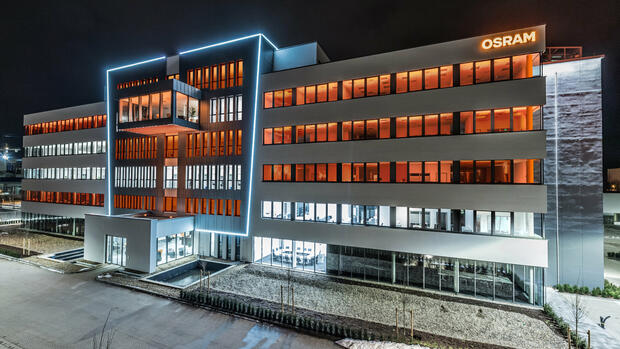The lighting company wants to develop new types of chips for autonomous driving and UV-C air purification with government support.
(Photo: OSRAM)
Munich The lighting and semiconductor company AMS-Osram is expanding its chip development in Germany and has secured funding worth more than 300 million euros. The money comes from the federal government and the Free State of Bavaria as part of the European Chips Act, Handelsblatt learned from company circles. In return, AMS-Osram will ensure the creation of 400 high-tech jobs.
In recent months, billions in subsidies for new chip factories in Germany have caused a lot of discussion. The US technology group Intel wants to invest 30 billion euros in two plants in Magdeburg, a third of which will be contributed by the state. The contract manufacturer TSMC is planning a new factory in Dresden, which will be funded with up to five billion euros.
The subsidies are intended to promote the development of a stronger European chip industry. Osram is now receiving so-called IPCEI (Important Project of Common European Interest) funding. The group did not want to comment on the information from the Handelsblatt.
Air purification with ultraviolet light
With the funding, which is supplemented by its own investments of approximately the same amount, AMS-Osram primarily wants to advance the research and development of innovative optoelectronic semiconductors and their production processes.
Specifically, for example, it involves lidar sensors for autonomous driving and UV-C LEDs for purifying air and disinfecting it with light. Such air purifiers were used in the corona pandemic. According to the manufacturers, ultraviolet light can almost completely eliminate viral and bacterial loads. Competitor Signify has also developed solutions.
According to industry circles, Osram also wants to develop micro-LEDs in Regensburg that will be used in new types of displays. To this end, the group is currently building a pilot line with a new kind of eight-inch wafer production, which should enable cost-effective large-scale production of micro-LEDs.
Production will start in Regensburg
The IPCEI funding supports the development of the chips and production processes. According to company circles, the production of new products will also partly take place in Regensburg – there will also be plants such as Kulim (Malaysia), whose new module is planned for the mass production of micro-LEDs.
The company can make good use of the subsidies. Because he is in a dilemma: AMS-Osram has to become more innovative in order to assert itself in the rapidly changing industry. At the same time, the company must get its financial problems under control.
>> Also read: German technology regulates the iPhone display: Apple raves about a Swabian family business
Because AMS-Osram is in a deep crisis. The smaller Austrian photonics specialist AMS took over the traditional German company Osram a good three years ago. Since then, the new group has suffered from a high mountain of debt.
The net financial liabilities were recently around two billion euros. In the first half of the year, the company made a loss of 1.5 billion euros, mainly due to high depreciation.
As a result, the new CEO Aldo Kamper has announced that he will spin off further parts of the company. They will divest themselves of “areas outside of the core business with a sales volume of 300 to 400 million euros”. This corresponds to around ten percent of the total revenue. According to industry circles, the sale is difficult. After all, these are low-prospect, low-margin areas such as older cell phone technologies and scatter lenses.
The sale of parts of the company is making slow progress
Large sales revenues are therefore not expected. AMS-Osram’s problem: Larger loans will expire in 2025. The group has “an actually functioning business model, but a poor balance sheet structure,” said an insider. The goal must be to survive the crisis as an independent company. AMS-Osram is essentially a healthy company. “If the new management manages the refinancing, the group will finally have a few years of peace to continue developing the strategy.”
More: China wants to boost the chip industry with 40 billion funds.
